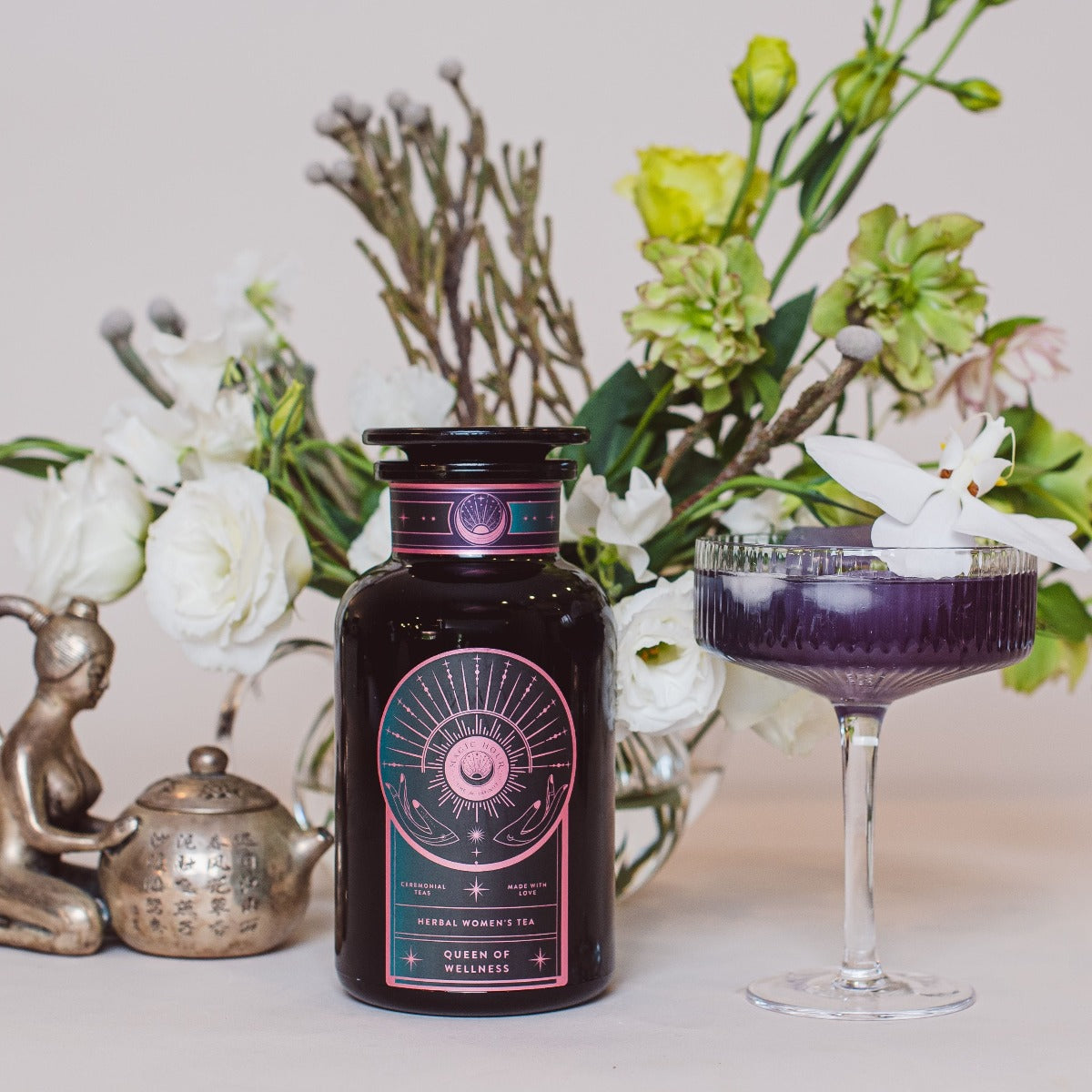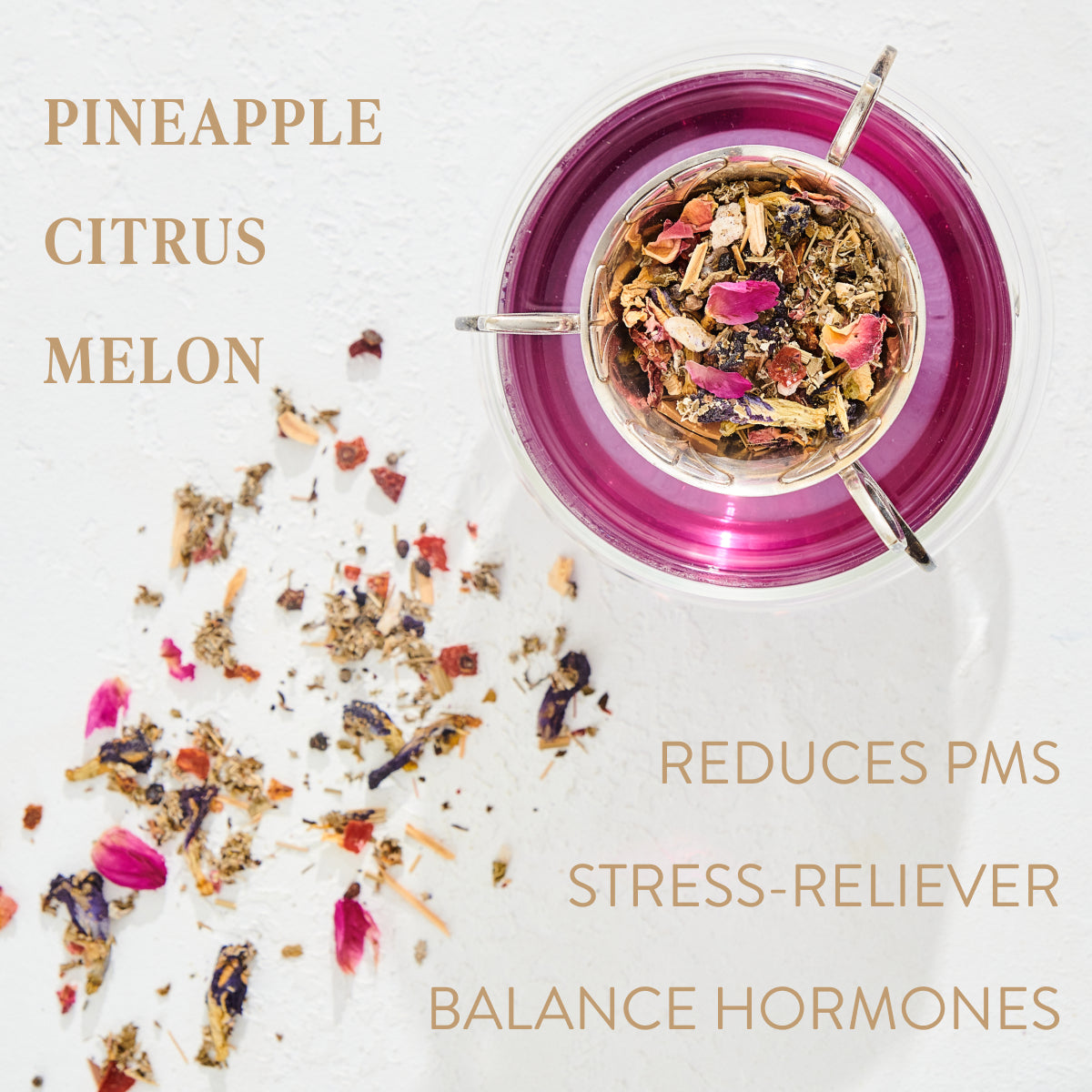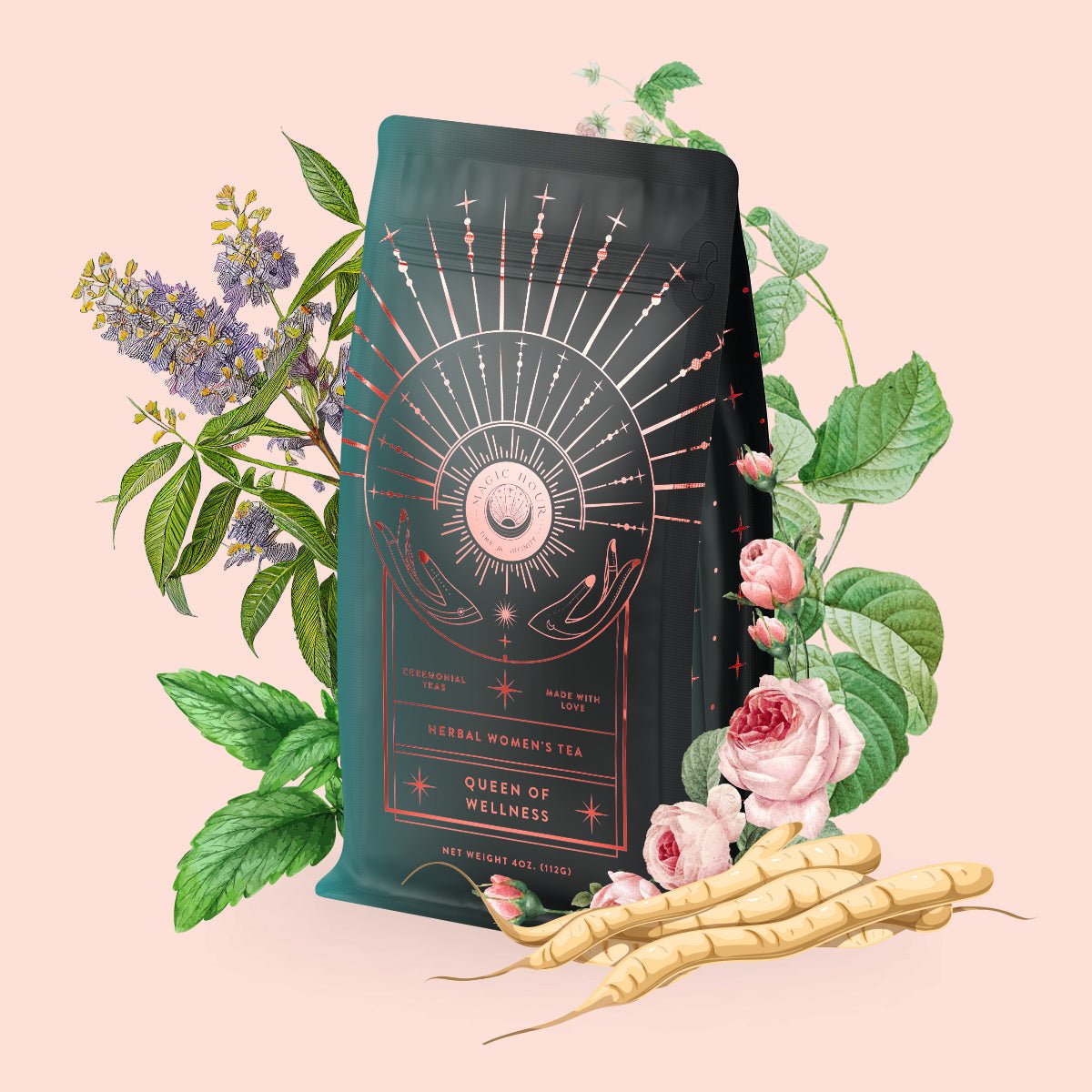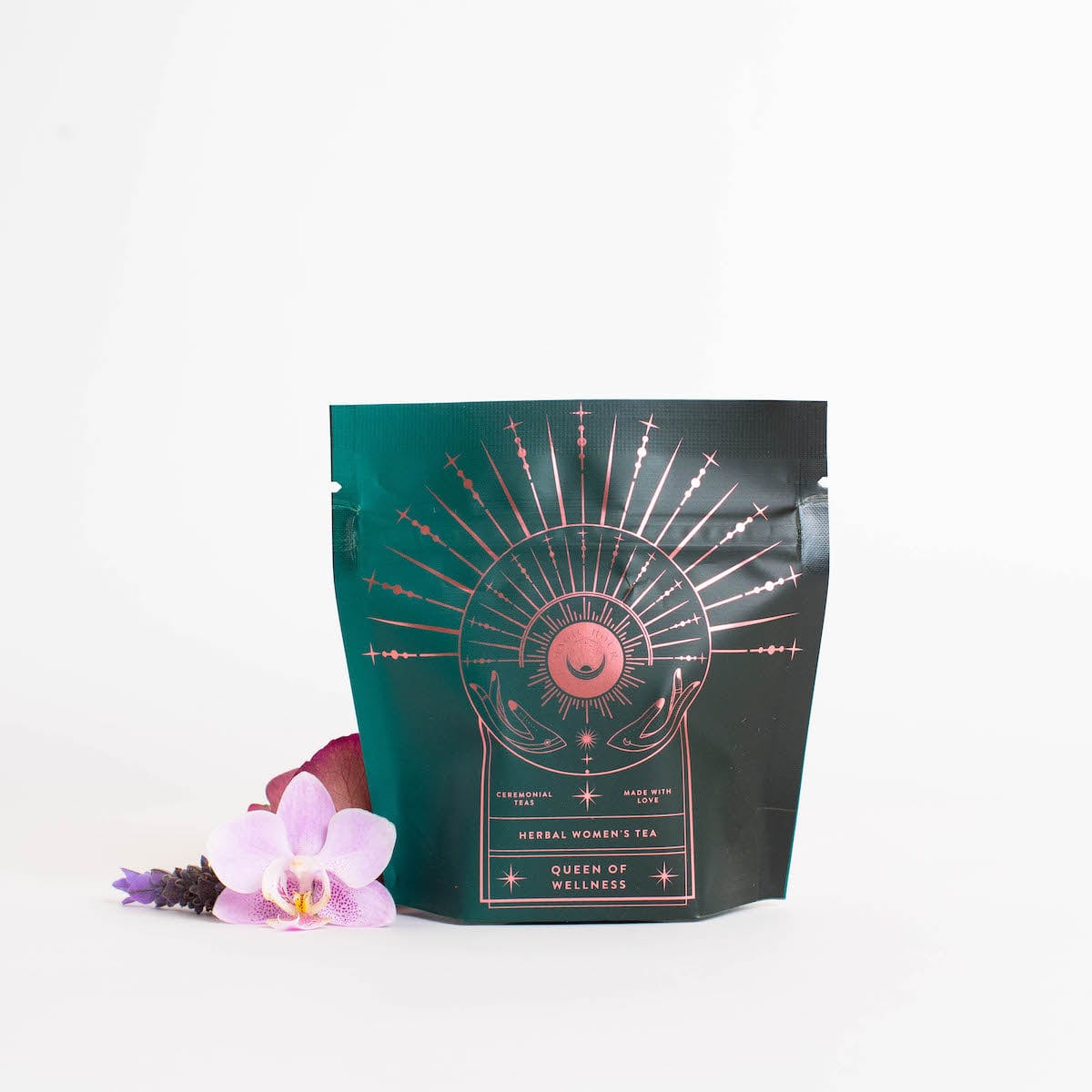Who doesn’t love a cup of rich, comforting chai? With its perfect balance of sweet and spicy, chai tea is the perfect way to replace your morning coffee without some of the harsher side effects. If you're a fan of this aromatic brew, you're in the right place.
In this guide, we'll delve into the chai tea benefits, explore what makes this tea so special, and provide tips on how to make the perfect cup. We'll also cover potential side effects and answer common questions about chai tea.
Grab a cozy seat, and let’s learn more about this sultry tea.
What Is Chai Tea?
Chai tea, with its rich history and flavorful complexity, originates from vibrant India.
Traditionally known as masala chai, this beloved beverage has been a staple in Indian households for centuries. The word “chai” simply means “tea” in Hindi, but the magic lies in the “masala,” a blend of spices that transforms ordinary tea into an extraordinary experience.

The base of masala chai is typically strong black tea, often Assam or Darjeeling, which is known for its robust flavor.
To this, tea makers add spices, such as cinnamon, cardamom, ginger, nutmeg, cloves, and star anise. Each adds its own unique note to create the tea’s sweet and spicy aroma. Tea makers also sometimes include a pinch of black pepper for a subtle kick.
Chai tea’s popularity has surged, captivating tea enthusiasts worldwide with its warming and aromatic profile.
In India, chai is more than just a drink — it’s a symbol of hospitality, often enjoyed with friends and family. The creamy texture from adding milk and the sweetness from sugar or honey makes it an indulgent treat.
Try it with maple syrup for an ultra-rich buttery flavor!
As chai tea has spread beyond Indian borders, other cultures have embraced it, each adding its own twist. From cozy cafes in bustling cities to quiet kitchens in rural areas, chai tea has become a beloved beverage worldwide, celebrated for its rich heritage and enchanting flavors.
Benefits of Chai Tea
Chai tea is more than just a delicious beverage — its spices also contain unique health properties.
Read on to learn more about the potential wellness benefits chai tea offers.
Full of Antioxidants
Chai tea offers a primary health benefit through its high antioxidant content. Antioxidants protect the body from oxidative stress and free radicals. Both can cause chronic diseases and aging.
Black tea leaves, often used as the base for chai, contain polyphenols, which are powerful antioxidants. Spices like cinnamon bark and ginger root in chai enhance its antioxidant profile, boosting its health-promoting properties.
Improved Digestion
Chai spices, like ginger, cardamom, and cloves, may help with gastrointestinal issues.
Ginger, in particular, may reduce nausea symptoms better than some anti-nausea medications. These spices work together to improve digestion, reduce bloating, and promote a healthy gastrointestinal system.
Relieves Menstrual Symptoms
Chai tea can be a soothing remedy for menstrual discomfort. Ingredients like ginger, cardamom, and cinnamon have anti-inflammatory properties that can help relieve cramps and bloating.
Reduces Headaches and Migraines
Drinking chai tea can reduce headaches and migraines.
The caffeine in black tea constricts blood vessels, which may help pain medication work more effectively. Ginger can also help with muscle soreness and headaches with its pain-relieving properties.

Cinnamon, ginger, and cardamom also have anti-inflammatory effects, which may help reduce headaches and migraines.
Improves Brain Function
Chai tea’s cognitive benefits are another reason to enjoy this beverage.
All types of black tea contains caffeine and L-theanine, a combination that may enhance cognition, improve focus and concentration, and increase energy levels. These compounds work together to promote mental well-being and reduce stress and anxiety, making chai tea a perfect drink for boosting brain function.
Improved Skin
Chai tea is also beneficial for the skin thanks to its high vitamin and mineral content, including zinc, magnesium, and potassium. These nutrients help protect and rejuvenate the skin, keeping it hydrated and nourished.
Better Heart Health
Drinking chai tea can have positive effects on cardiovascular health and blood circulation.
Antioxidants in black tea may help lower blood pressure and cholesterol levels, prevent plaque buildup in arteries, and promote better blood circulation.
These benefits may improve heart health and reduce heart disease risks.
Lower Risk of Type 2 Diabetes
Chai tea, when made with black tea, may reduce type 2 diabetes risk.
Research has shown a correlation between black tea consumption and a lower risk of developing type 2 diabetes. The bioactive compounds in black tea, such as polyphenols, help improve insulin sensitivity and reduce blood sugar levels.
Reduces Inflammation
Chai tea contains rich ingredients with anti-inflammatory properties. Black tea, ginger, cinnamon, and cardamom can reduce inflammation in the body.
These ingredients help with symptoms you may experience from muscle soreness, arthritis, autoimmune disorders, and IBS. If you’re on an anti-inflammatory diet, ask your doctor about adding chai tea to your regimen.
Boosts Immune System
Ginger, cinnamon, and star anise in chai tea have powerful anti-inflammatory properties that may enhance the immune system. Vitamin C in chai spice blends can also boost immunity and protect against common illnesses and infections.
Soothes a Sore Throat
Chai is a good tea for a sore throat.
Ginger and cinnamon warming properties, combined with their anti-inflammatory effects, can help alleviate throat pain and discomfort. When you have a sore throat, drinking chai tea can provide relief and promote faster healing.
Lowers Blood Pressure and Blood Sugar
Ingredients in chai tea can help lower blood pressure and blood sugar levels. Black tea’s flavonoids may reduce plaque buildup in arteries and alleviate stress on the heart.
Cinnamon may also help treat cardiovascular diseases and lower harmful cholesterol levels, making spicy tea beneficial for some people’s cardiovascular health.
Promotes Oral Health
Chai tea promotes oral health with ginger’s antibacterial properties and black tea’s anti-inflammatory effects. Cinnamon can also soothe pain and reduce inflammation — and cardamom also helps by freshening breath and fighting bacteria.
Increases Energy
The caffeine in chai tea provides a natural energy boost, while L-theanine promotes alertness and focus.
This combo makes chai tea an excellent choice if you’re looking to increase energy levels (potentially without the jitters you might experience with coffee).
Reduces Stress and Anxiety
Chai tea may help reduce stress and anxiety thanks to its calming effects and spices like ginger, cloves, and cardamom.

The L-theanine in black tea also helps bring a sense of calm and relaxation, making chai tea a soothing drink for those dealing with stress.
Relieves Constipation
Chai tea may relieve constipation. Its caffeine from black tea offers a mild laxative effect, while the ginger offers calming and digestive benefits. This combination helps promote regular bowel movements and alleviates digestive discomfort.
Increased Bone Density
Research has shown that drinking tea can contribute to increased bone density. The flavonoids and other nutrients found in tea help strengthen bones, which can reduce fractures and osteoporosis risks.
Fight Bacterial and Fungal Infections
Chai tea has antimicrobial properties that can help fight bacterial and fungal infections.
Ingredients like ginger, cardamom, cloves, and star anise may help suppress biofilm and prevent infectious fungi formation.
Improve Insulin Sensitivity
According to University of Adelaide, the black tea, along with spices like cinnamon and ginger, can help reduce the risk of insulin resistance and type 2 diabetes. These ingredients work together to improve blood sugar levels and support healthy glucose metabolism.
May Help Lose Weight
Chai tea may support weight loss.
The protein content from milk (whether cow’s milk or soy milk) and black tea’s appetite-suppressing effects help prevent overeating. Compounds in black tea may also promote fat breakdown and reduce calorie absorption.
A chinese research indicates that black tea (specifically oolong tea) might be more effective than green tea in maintaining a healthy weight.
Possible Side Effects of Chai Tea
While chai tea may offer many health benefits, every beverage or food product has potential side effects. Depending on your health and unique body, you may experience some, all, or none of the following:
Jitters
Some chai drinkers experience jitters from caffeine and sugar in pre-made chai drinks or chai lattes. Caffeine stimulates the nervous system, making the body feel restless and anxious, especially if you’re sensitive to caffeine.
To lower this risk, opt for homemade chai tea, where you can control the amount of caffeine and sugar. You can also drink decaffeinated chai tea or sugar-free chai options to help minimize jitters.
Hint: You’ll love our Lucid Dreams blend! (packed with relaxing Tulsi, chai spices, and island-y coconut flavors). There’s no caffeine or sugar — just warm, comforting goodness!

Insomnia
Chai tea may lead to insomnia (difficulty falling or staying asleep). Its caffeine content can interfere with sleep patterns. The sugar in some chai drinks can also contribute to this issue by causing blood sugar spikes that disrupt sleep.
To avoid insomnia, limit your chai tea intake, especially before bedtime. You can also drink decaf and sugar-free options like we mentioned above.
Upset Stomach
Some chai tea drinkers experience stomach discomfort, often from the spices or tea’s acidity. While beneficial, ingredients like ginger and cinnamon can sometimes cause digestive discomfort.
If you have a sensitive stomach, try reducing the spice concentration in your chai tea or drinking it with food. Adding more milk may also help neutralize the acidity and reduce stomach discomfort.
Headaches
Some chai tea drinkers have headaches from the caffeine content. While caffeine can relieve headaches for some, it can trigger them in others.
To reduce headache risk, moderate your caffeine intake by drinking fewer cups of chai tea or opting for decaf. Drinking plenty of water may also help prevent caffeine-related headaches.
How to Make Chai Tea

Ready to take advantage of chai tea benefits?
You’ll love our:
Let’s take a look at how to make chai tea varieties:
Chai Tea vs Chai Latte
Chai tea and chai latte are both delicious ways to enjoy this cherished drink.
For a bold, aromatic brew, chai tea blends spices like cardamom, ginger, and cinnamon with black tea. On the other hand, chai latte adds frothed milk for a creamy, indulgent twist. Each version has its own unique taste and texture.
Making Chai Tea With Fresh Ingredients
To make chai tea with fresh ingredients, gather black tea, cardamom pods, ginger, cinnamon sticks, cloves, black peppercorns, and milk.
Crush the spices lightly to release their flavors, then combine them with water and bring to a simmer. Add black tea and let it steep for seven to ten minutes. Strain the mixture and add milk to taste.
Making Chai Tea With Dried Ingredients
To make chai tea with dried ingredients, start by combining dried black tea leaves with ground cardamom, ginger, cinnamon, cloves, and black pepper.
Crush the spices with a mortar and pestle, releasing their aromatic oils. Brew the mixture in hot water, allowing the flavors to meld together, then strain and serve with milk.
Making Hot Chai Tea
- Brew your chai: Make hot chai tea according to the instructions.
- Steam your milk: Warm and froth your preferred milk — whether it’s dairy or non-dairy — using a milk frother or steaming wand.
- Combine and enjoy: Pour the brewed chai into a mug. Then, add the steamed milk on top. Finish with a sprinkle of cinnamon for extra warmth. Now, savor your delicious homemade chai latte!
Making Iced Chai Tea
- Make chai concentrate: Double the tea leaves or bags to brew a strong batch of chai tea. Steep for seven to ten minutes and let it cool completely. At this stage, you can also sweeten it.
- Mix and chill: Combine the chai concentrate with your favorite milk or milk substitute. Experiment with the water-to-milk ratio. For example, you might prefer a 50/50 ratio or 30/70 ratio. Pour over ice in a glass that’s 3/4 full, and enjoy the refreshing, spiced flavor!
Chai Tea FAQs
Here are some common questions about chai tea:
What does chai tea do for your body?
Due to its spices and black tea, chai tea offers potential health benefits. It may help with digestion, reduce inflammation, improve heart health, and promote relaxation and mental clarity.
Is chai tea good to drink every day?
While enjoying chai tea daily can be helpful for some people, for others, moderation is key. Some people may need to limit their intake due to caffeine sensitivity or specific health conditions. Consult with a healthcare professional to determine the right amount for you.
Is chai tea anti-inflammatory?
Yes, chai tea can have anti-inflammatory properties due to the spices it contains, such as ginger, cinnamon, and cloves. These spices may reduce inflammation in the body and offer relief from conditions like arthritis and muscle soreness.
Is chai healthier than coffee?
Chai and coffee offer different health benefits and drawbacks.
Chai tea contains less caffeine than coffee, making it a gentler option for those sensitive to caffeine. Chai spices also have antioxidants and other health-promoting compounds. However, individual preferences and dietary needs should dictate which beverage is best for you.
What’s Your Favorite Chai?
Chai tea’s luxurious spices and potential health benefits make it a delicious and beloved beverage worldwide.
Whether you prefer your chai black and extra spicy or creamy and rich, there’s a chai variety with your name on it.
Let Magic Hour’s Tea Quiz guide you to discover your favorite chai blend.
Cheers to enjoying chai’s comforting warmth and aromatic charm!











